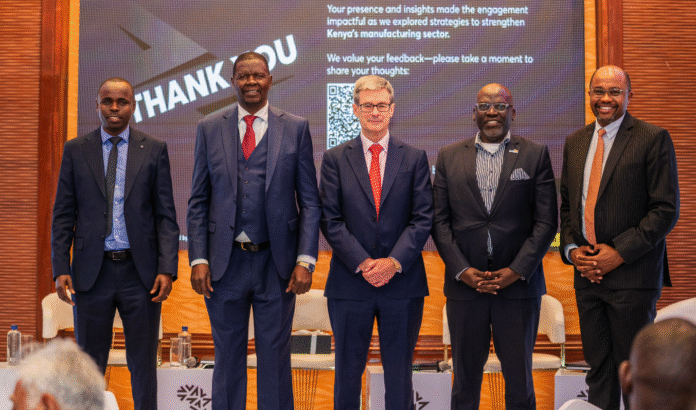NCBA Bank, in collaboration with the Kenya Association of Manufacturers (KAM), has called for a rethink of Kenya’s industrial financing model, highlighting value chain financing as critical to unlocking growth in the manufacturing sector.
Speaking during a CEO breakfast forum in Nairobi themed “Unlocking Growth in Manufacturing through Value Chain Financing,” NCBA Group Director of Corporate and Investment Banking Advisory, Tirus Mwithiga, said the country must overhaul how capital flows through the industrial ecosystem.
“Manufacturing contributes just 7.3% to GDP, well below the Vision 2030 target of 20%,” Mwithiga noted. “We are committed to going beyond banking, supporting manufacturers with tailored financial products, policy advisory, and long-term partnerships.”
NCBA highlighted products including asset leasing, trade finance, and supply chain financing as key tools in easing cash flow pressures and driving business sustainability.
Kenya’s manufacturing sector employs over 350,000 people directly and 1.6 million indirectly, but faces persistent challenges, including limited access to affordable capital, supply chain fragmentation, and weak regional competitiveness.
According to the Kenya National Bureau of Statistics (KNBS), the sector grew by just 2.1% in Q1 2025, contributing to an overall GDP growth of 4.9%.
KAM Chief Executive Tobias Alando underscored the urgency of systemic financing innovation: “Everyone in the value chain — from farmer to processor — must be bankable. That requires financing structures aligned with production cycles.”
He called for long-term, affordable credit instruments to de-risk investments, especially in primary processing and SME expansion.
The forum ended with renewed calls for closer collaboration between industry players, financiers, and government to deliver the enabling environment Kenya’s manufacturers need to scale.
















![[Full List] – Safaricom, Absa and Britam Named Among Top Employers for 2026](https://uzalendonews.co.ke/wp-content/uploads/2026/01/Screenshot-2026-01-15-190157-218x150.png)


